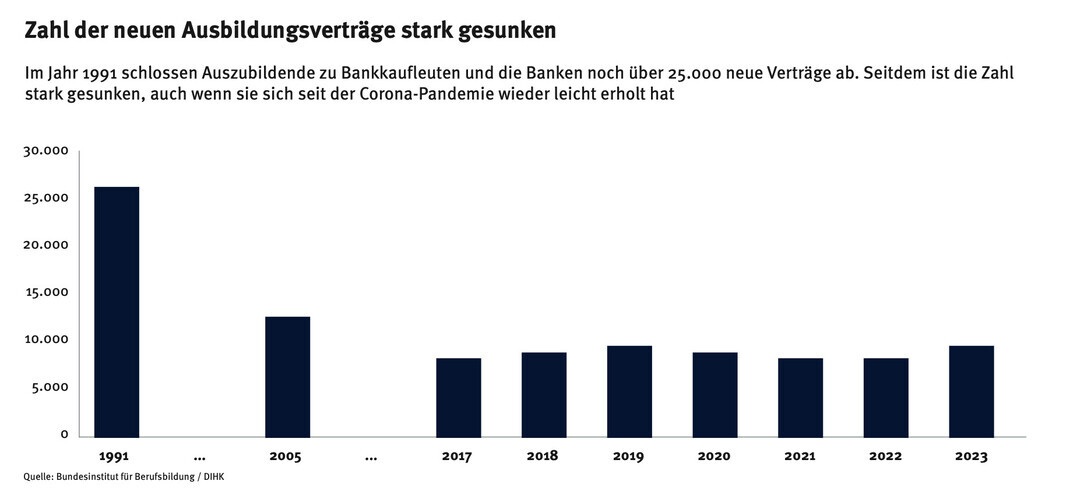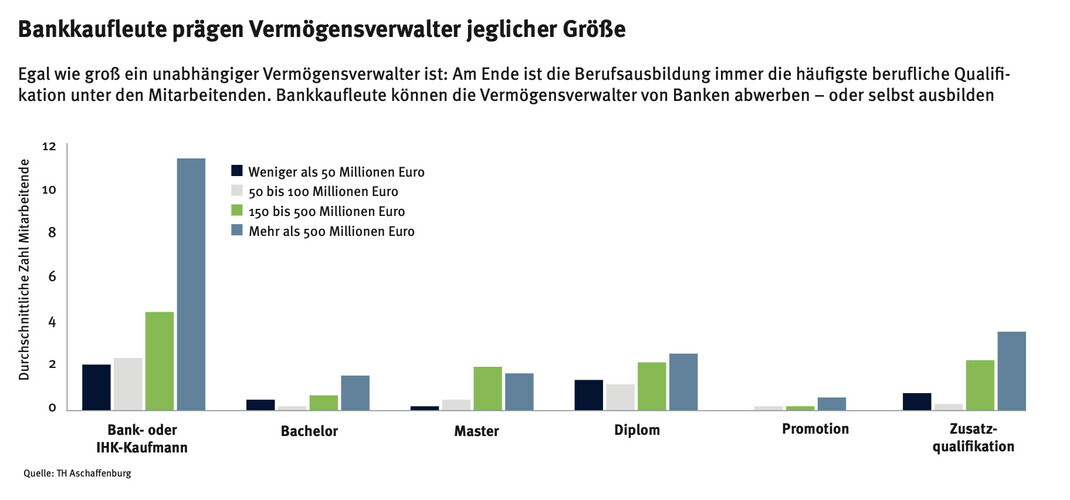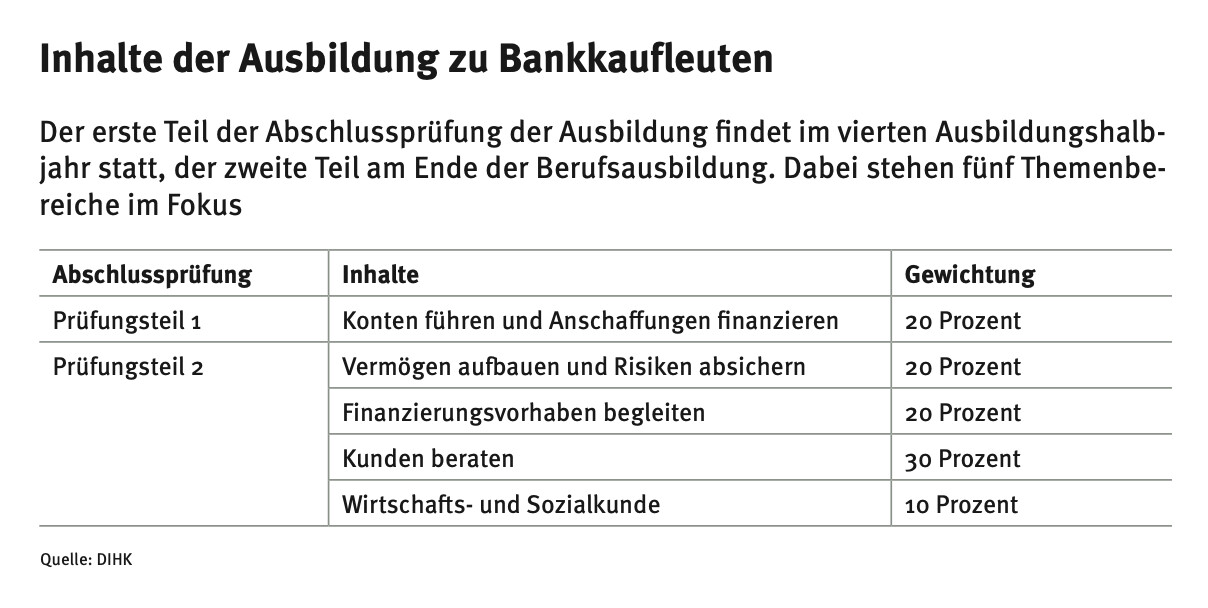A question of teaching: How asset managers can also train bankers

When Jörg Mohm completed his apprenticeship, he was just one of many. Back then, around 1990, more than 25,000 trainees signed new training contracts with German banks each year. Many of them, like Mohm, ended up in private wealth management, family offices, or asset managers, where bank clerks still significantly outnumber academics.
The apprenticeship was actually one of the most popular in Germany. The prospect of an above-average salary, good career opportunities, and high prestige attracted young people to the apprenticeship, Mohm explains, looking back. However, much has changed since then.
Jörg Mohm's son Leon is therefore one of a small number. Like his father, he completed an apprenticeship as a bank clerk. This makes him one of only 7,000 to 8,000 apprentices who currently sign a bank clerk training contract each year. Both the number of apprenticeships and the demand for corresponding positions have declined dramatically in recent years and decades.
Training profession suffered for yearsThere are plenty of reasons for this. A 2020 survey by the Hans Böckler Foundation demonstrates this impressively: Employees advise against banking as a training occupation more often than any other. Two-thirds of bank clerks believe their training is not sustainable. According to the study, bank clerks' concerns include digitized advisory processes, waves of layoffs, and closures in traditional branch business.
Simon Grupe, head of the department for commercial and service professions at the German Chamber of Industry and Commerce, also confirms the trend: "The reasons for this are demographic change, which is also affecting other sectors in the form of declining school leaver numbers, as well as restructuring processes in the banking sector, which have included branch closures and a shift to digitalized business models."
This is driving up the salaries that private banks and asset managers have to pay in their narrowly defined client segment. The lack of young talent is making advisory teams in demand, and the average age of employees is rising, as surveys show. More and more independent asset managers are also slipping under the wing of international holding companies, partly due to a lack of young talent.
Commerzbank is turning the advisor shortage into a virtue. Where the bank once trained hundreds of bank clerks who were left to fear for their jobs in the retail sector due to the location closures of recent years, the bank is now attempting a more targeted approach. In job postings and online articles, it advertises apprenticeships as bank clerks specifically for private wealth management. If they successfully complete their studies, trainees receive a guarantee that Commerzbank will offer them permanent employment.
Markus Dietrich isn't keen to hear that the apprenticeship has become less important given the drastic decline in apprenticeship numbers. Dietrich works as a junior coordinator in Wealth Management and Private Banking at Commerzbank and asserts that the apprenticeship as a bank clerk continues to play a significant role in the business: "Many of our advisors who currently work in Private Banking and Wealth Management at Commerzbank began their careers with a dual business studies program or with a banking apprenticeship."
Publicly available figures show, however, that Commerzbank also significantly reduced the number of its trainees between 2010 and 2016, dropping by more than half at one point. Dietrich argues: "In addition to the dual business administration and banking degree program, we have always covered at least 50 percent of our new hires with junior employees with banking training."
The HR department could have hired more trainees, especially for bank clerks. Dietrich also observes that there is a shortage of both men and women in private wealth management: "The demand for young talent has increased significantly, especially in the last three years." And the best path into private wealth management is, after all, an apprenticeship.
New content, new modelsBut it has to be contemporary. During his training, Mohm learned about the special features of deliveries and purchases in overseas countries. His son's training looked very different. In 2020, the Chambers of Commerce, together with the banking associations, ministries, and teacher representatives at the Federal Ministry for Vocational Education and Training, modernized the training.
This was precisely the year in which the Hans Böckler Foundation published its alarming survey results on the banking apprenticeship. The training had remained unchanged for over 21 years.
"Given that business processes in the industry have become almost entirely digital, it seemed obvious that new requirements would also arise for initial training," Grupe argues about the new vocational training. The focus now is on customer relationships and how digital channels can be used to achieve this.

A good starting point for a step into private wealth management. "In addition to holistic client consulting, the training program also includes methodological skills relevant to project-oriented working methods and the optimization and further development of standardized processes," says Grupe.
However, university studies are also considered a natural enemy of some vocational training occupations. A study by the Bertelsmann Foundation suggests that not every vocational training is jeopardized by the prospect of an academic career. Nevertheless, study co-author Naemi Härle points out, somewhat awkwardly, that, particularly in commercial professions, "clear evidence of a substitution of vocational with academic careers" can be seen.
Therefore, for some young professionals, the prospect of a Master of Business Administration seems more attractive on their resumes than an apprenticeship at a bank. Commerzbank tries to offer both options to its bank trainees and also encourages subsequent university studies.
Traditional private banks like Warburg and Berenberg Bank also offer "study-integrated training" for future bank clerks. They can study business administration, for example, at the same time. "An outlook on what options might arise after completing their initial training is an important aspect for many interested applicants," explains DIHK expert Grupe, adding: "The banking profession is sometimes combined in degree programs that integrate training with other courses, thus enabling dual degrees."
And then there's also the opportunity to train as a bank clerk without even starting at a bank. Mohm's son did this. He began his training in his father's business. The company doesn't have a banking license and isn't even a securities institution. Instead, Mohm works with the umbrella organization Finum Private Finance – like over 100 other independent advisors. Given this situation, how can Mohm train his son to become a bank clerk?
Bank clerks without a bankDIHK representative Grupe points to more flexible training options than a few years ago: Cooperation models in the form of joint training are possible. "The company-based training phases are completed in collaboration with various training partners," Grupe explains. Interested training companies can clarify exactly what such a model might look like with the Chambers of Industry and Commerce and coordinate it in the training plan.
Mohm did just that. The local Chamber of Commerce and Industry compared the service catalog of its Finum liability umbrella with the requirements of the training framework agreement and found only two minor gaps in counter business and consumer loans. Since counter business also plays only a minor role in traditional banking today, and Mohm's son had been able to familiarize himself with the lending business at the Finum Financing Competence Center, nothing stood in the way of his training.

"The requirements of the Vocational Training Act and the minimum requirements of the training regulations can be met by most companies – those who need and are looking for young talent will find a way within this framework," explains Grupe of the German Chamber of Industry and Commerce (DIHK). It is also conceivable, for example, for trainees to complete certain training stations at third-party companies.
The costs of becoming a training company are low: A collective bargaining agreement regulates not only aspects such as vacation entitlements, but also training remuneration. In addition, training companies only pay a few fees to the Chamber of Commerce and Industry, explains Mohm: "The costs are manageable; the standard training contract regulates all important aspects."
If a company has its own license as a bank, securities institution, or operates under a limited liability umbrella, it can usually train junior staff itself. This is especially helpful for independent asset managers, says Mohm. Especially since, according to a survey conducted by the Institute for Asset Management at the Aschaffenburg University of Applied Sciences, they once again see recruiting as their biggest challenge.

Training their own employees is a solution they often don't even know about. "Until now, trainees often only had the choice between savings banks and cooperative banks, sometimes even large or private banks," notes Mohm. "All other financial service providers have paid a lot of money to acquire qualified bank clerks."
Looking for perspectivesMohm wants to prevent his son from receiving an offer and leaving the company at some point by offering a clear perspective: "In the short term, an apprenticeship will produce a well-trained employee, and in the medium or long term, perhaps even a successor who will take over the business. But the apprentices must also have that in mind."
There are also opportunities for trainees in the private wealth management departments of major and private banks. Klaus Naeve, Head of Wealth & Asset Management at Berenberg, explains: "Younger colleagues don't have long-term commitments and don't have large books. Their asset demands are therefore lower – we see them primarily as acquisition professionals who are building their books with us."
For example, junior employees can take on some of the clients left behind by consultants after retirement. Their generally younger age also allows trainees to gain a different approach to clients.
For Commerzbank trainer Dietrich, training young talent also has clear advantages: "With our professional financial input during vocational training, we have a strong influence on the specialist knowledge of our future advisors." This way, they can lay the foundation for customer business and manage it.
"Furthermore, with a high number of young people through banking training, we create a healthy age mix among our teams and customers." Commerzbank intends to continue training its own employees. And it's not alone in this.
Indeed, there are signs of a certain trend reversal in the number of bank clerk training contracts. Training companies have already surpassed the pre-coronavirus numbers. Approximately 8,700 bank clerks began their training in 2023. Among them: Mohm's second son, who is following in his older brother's footsteps. He will then be one of several more.
private-banking-magazin





